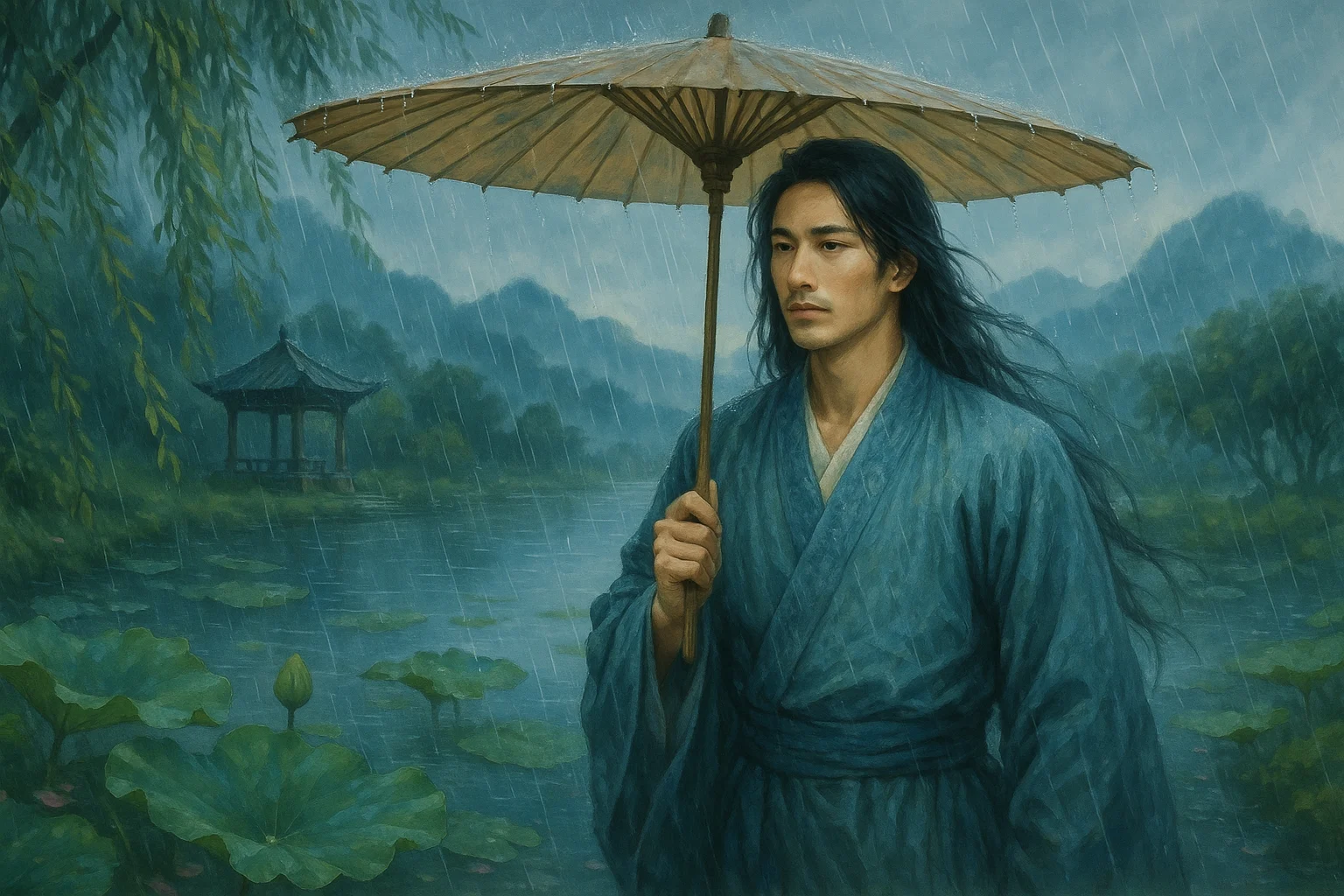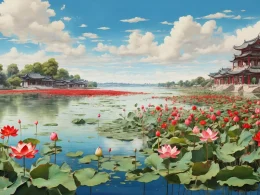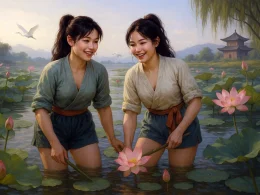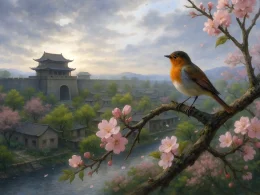Few in this world share your noble soul so true,
Thus time dares not lay aging dust on you.
But who notices my fading grace?
They say my heart’s no longer youth’s bright face.
Yet spring winds reach southern roads anew,
Where flowers bloom by railings in deep hue.
When I gaze at these blooms, hear my call—
It’s not peonies I seek, but our past’s golden thrall.
Original Poem
「虞美人 · 平生臭味如君少」
平生臭味如君少。自是君难老。
似侬憔悴更谁知。
只道心情不似、少年时。春风也到江南路。小槛花深处。
吕本中
对人不是忆姚黄。
实是旧时风味、老难忘。
Interpretation
This lyric, composed during Lü Benzhong's middle age amid the Southern Song's tumultuous early years, distills a lifetime of political upheaval and personal weathering into a meditation on friendship and time's passage. Having witnessed dynastic collapse and territorial fragmentation, Lü here contrasts his own world-weariness with a seemingly untouched companion, using Jiangnan's spring scenery as a foil for their diverging fates. The poem moves from personal lament to universal resonance, where flowers become portals to irretrievable youth.
Upper Stanza: "平生臭味如君少。自是君难老。似侬憔悴更谁知。只道心情不似、少年时。"
Píngshēng chòuwèi rú jūn shǎo. Zì shì jūn nán lǎo. Sì nóng qiáocuì gèng shéi zhī. Zhǐ dào xīnqíng bù sì, shàonián shí.
Few in this life share my deepest likings as you do—
thus, of course, you defy aging.
But who notices my withering like yours?
They only say my heart
no longer beats as youth’s once did.
The stanza opens with an intimate confession: "shared likings" (臭味), literally "shared smells," refers to profound compatibility rarely found. The friend’s agelessness (难老) highlights Lü’s own decline, marked by "withering" (憔悴)—a physical and spiritual exhaustion from political storms. The closing line’s heart metaphor lays bare the poem’s core: time’s theft of youthful vitality.
Lower Stanza: "春风也到江南路。小槛花深处。对人不是忆姚黄。实是旧时风味、老难忘。"
Chūnfēng yě dào Jiāngnán lù. Xiǎo kǎn huā shēn chù. Duì rén bù shì yì Yáohuáng. Shí shì jiùshí fēngwèi, lǎo nánwàng.
Spring winds still reach Jiangnan’s paths,
still pool where courtyard flowers bloom thick.
I tell people I’m not recalling peonies—
but in truth, it’s that old flavor
age cannot erase.
Here, spring’s cyclical return underscores human linear decay. The "peonies" (姚黄), supreme symbols of Tang-Song opulence, represent irretrievable glory days. Lü claims indifference to them, yet "that old flavor" (旧时风味)—a synesthetic blend of sensory and emotional memory—betrays his nostalgia. The admission "age cannot erase" (老难忘) confesses time’s paradoxical cruelty: the past grows more vivid as the body weakens.
Holistic Appreciation
The emotional undertone of this ci is nostalgia and wistful reflection. Lü Benzhong uses Jiangnan’s spring scenery as a vessel to convey the stark contrast between fading youth and enduring past affections. Within these lines, we find deep appreciation for kindred spirits, self-mocking acknowledgment of personal decline, sunlit spring vistas, and an intimate sorrow over time’s ruthlessness.
The first stanza delves into inner turmoil—moving from the rarity of true friendship to the ache of aging, emotions deepening layer by layer. The second stanza awakens memories through spring imagery but transcends mere description; instead, it evokes "old-time charm" through scenery, weaving "scene—emotion—meaning" into an intricate tapestry. This approach imbues the poem with profound melancholy beneath its temperate surface, leaving readers with lingering resonance.
Artistic Features
- Self-Reflection Through Others
Highlighting the friend’s agelessness against his own weariness sharpens emotional contrast, amplifying the poignancy. - Scenery and Sentiment Mutually Ignite
Spring breezes, Jiangnan landscapes, small railings, and flower depths aren’t just atmospheric—they become triggers for memory and feeling. - Fusion of Allusion and Symbolism
"Yao’s yellow peonies" symbolize both legendary beauty and bygone splendor, enriching emotion with cultural depth. - Understated Language, Profound Feeling
Eschewing hyperbole, the poem unfolds in gentle cadence, burying intensity within calm narration. - Structure: Inner to Outer, Emotion to Scene
Personal states precede scenic immersion, creating a cyclical fusion where feeling and landscape reflect each other.
Insights
This ci reminds us that what truly endures isn’t a specific place or conversation but the "old-time charm" woven into our life’s fabric. Youth fades, yet emotional imprints transcend time, echoing in memory’s depths. It urges us to cherish the present while embracing changes in appearance and spirit with equanimity—for life’s truest treasures are people and moments that remain "unforgettable even in old age," not youth itself. sensitivity and emotional nuance, maintaining clarity and composure amid chaos.
About the Poet

Lü Benzhong (吕本中 1084 - 1145), a native of Shouxian in Anhui, was a renowned poet and Neo-Confucian scholar of the Southern Song Dynasty. As a key theorist of the Jiangxi Poetry School, he proposed the concept of "living method" (huofa), advocating for natural variation within established poetic rules. With over 1,270 surviving poems, his Genealogy of the Jiangxi Poetry School (Jiangxi Shishe Zongpai Tu) established Huang Tingjian as the school's patriarch, profoundly influencing Song poetic theory and serving as a bridge between the Jiangxi School and the Four Masters of the Mid-Song Revival.












